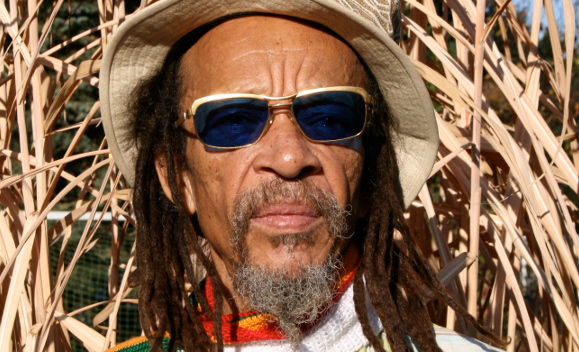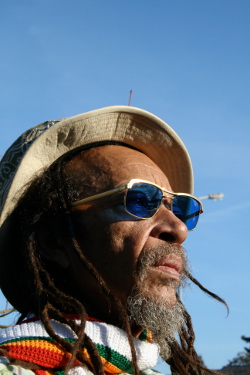Articles about reggae music, reviews, interviews, reports and more...
Interview: Kiddus I
- Home
- Articles
- Interviews
- Interview: Kiddus I

Interview: Kiddus I
"Digital music weakens the immune system"
Sampler

Kiddus I wants to deprogram and reprogram this topsy turvy world
Jamaican recording artist Kiddus I made a name for himself in the mid 70s with the single Graduation in Zion along with a short cameo in the cult classic motion picture Rockers. He recorded an album that was lost and in the early 80s he suddenly disappeared and resurfaced more than 20 years later. A few months ago he dropped the new set Topsy Turvy World and United Reggae had a chat with this deeply spiritual singer and percussionist.
Kiddus I is probably not one of the most well-known reggae singers. But things could have been different if the album he had recorded in the late 70s hadn’t been lost. It was found in 2007, released two years later and if it had been put out at the time Kiddus I might have been one of the world-famous reggae greats. But that’s a big if.
Frank Dowding was born in 1944 and became a Rastafarian in the early 70s. He took the name Kiddus I and joined Ras Michael and the Sons of Negus as vocalist and drummer. He also recorded several tunes as a solo artist and left the group in 1978 to pursue a solo career.
“Ras Michael and I still work together, we’re still family, we’re still brothers” says Kiddus I over the phone from Kingston where he spends most of his time.
He explains that I called at the right time, but it’s a little chaotic around him with lots of background noises and children shouting and screaming. But it’s no problem hearing what he’s saying. He has a deep and clear voice and talks a lot.
“Physically I’m not much different today,” he laughs, and continues:
“I’m a few pounds lighter, grey beard, but the rest of me is the same.”
And even though he has had his share of misfortune over the years he doesn’t give it much thought.
“It’s life, and I give thanks to the people I’m still associated with. I’m still here, I still feel good and I’ve more to give,” he says.
Dropping out and returning more than 20 years later
His story is a fascinating one. Coming from a middle-class background, converting to Rastafari, appearing in a cult movie, recording with Lee Perry, dropping the majestic single Graduation in Zion and recording an album that was lost. Then suddenly dropping out of sight returning to the spotlight in 2004 with the acoustic Inna De Yard.
“I lived in the UK, in California, in Florida and in New York City. My career sort of went on in that period. I completed two or three LPs in England, but nobody wanted to hear uplifting music at the time, in the early 90s, so I didn’t release them,” explains Kiddus I, and continues:
“In 1992 I came back home from England and that was when Buju got conscious and Luciano and Sizzla came up and we started getting a change and a turning. That time came.”
But it took more than another ten years for a Kiddus I album to appear.
Joining Inna De Yard All-Stars
Earl “Chinna” Smith is a Jamaican prominent guitar player and he and Kiddus I go way back. They played together with Ras Michael in the 70s and when Chinna and French label Makasound initiated the acoustic Inna De Yard project Kiddus I was onboard. He was approached by Jamaican singer Winston McAnuff and label executive Nicolas Maslowski.
“They wanted to work with I and I. And it was an interesting project and a natural jam and they knew that I hadn’t been on the scene for many years,” he says.
As part of Ras Michael and the Sons of Negus he knew how to play deep, percussion-heavy and spiritual reggae and nyabinghi.
“I grew up with that and it was part of the natural groundation. I’m a member of the nyabinghi order with the drumming and the chanting. Not too much electric, only acoustic guitar and drums. Just natural,” he explains, and continues:
“Acoustic has warmth and a feeling as opposed to the electric. The acoustic is so much more harmonious and relaxing. It’s part of the groundation of Rasta.”
New album recorded in Germany and Jamaica
 His venture into acoustic reggae was in 2009 followed by his debut electric album Green Fa Life and his new album Topsy Turvy World has recently been released.
His venture into acoustic reggae was in 2009 followed by his debut electric album Green Fa Life and his new album Topsy Turvy World has recently been released.
It’s his third album in almost 40 years and was recorded in Germany with Sebastian Sturm’s JinJin Band and in Jamaica with a number of old-time friends and veteran session heavyweighters, including bass man Aston “Familyman” Barrett, keyboard player Tyrone Downie, Earl “Chinna” Smith and percussionist Uziah “Sticky” Thompson.
“I met the JinJin Band four years ago at a festival with Sebastian Sturm. I went to Germany and recorded for this album and the first time we did two tracks; Life is a Riddim and one more. So we said ‘let’s do an LP ’,” he explains, and adds:
“I’m pleased with most of it. It’s alright, you know, it’s good roots and the feel is original reggae style coming from that period.”
Topsy Turvy World is vintage roots reggae with deep bass lines, prominent organ and reflective and cultural lyrics. It’s reminiscent to a time when Dennis Brown, Gregory Isaacs, Burning Spear and Bob Marley reigned the charts.
“Kiddus I is roots, blues, reggae and jazz. I have some other projects with different music though,” he says, and continues reflecting on contemporary dancehall:
“I’ve no problem with certain type of riddims and I have done some things in the dancehall vein, but it’s synthesized tracks and I prefer analogue style, it’s better for the system. Digital music weakens the immune system.”
Mankind needs to be deprogrammed
To me Topsy Turvy World is a strange album title, and when I ask Kiddus I about it he seems surprised and don’t know where to begin or how to explain it.
“It’s topsy turvy, you know, when something is topsy turvy. It’s not balanced, it’s falling over. It’s topsy turvy. The world to me is sort of topsy turvy with global warming, terrorism, pollution, mishmash, abuse and political leadership,” he explains, and continues with great excitement:
“It’s not going as it should and it’s not stopping. The solution is simple – awareness. It’s a mindset. We need to deprogram ourselves and then reprogram us. Misinformation has been fed to mankind over the centuries. Development is based on misinformation. Mathematics, chemistry, physics are real, but all other is misinformation. We’re wandering lost spirits.”
Heading towards destruction
His solution is partly education, but he comes back to awareness and plunges into a long monologue about the moon, land, ocean and electromagnetic fields.
“Do we create peace and harmony for mankind? Are we participating? About 75 percent of mankind is water. From the ocean to the land. Every living being, regardless of position, is water. It’s a basic spiritual network,” he believes, and continues:
“Leadership is one of the major ships and it was inherited by mankind. But it has been misused and abused by corporations and governments. We need to be autonomous and create a government for the people, by the people. These assholes continue to misrepresent and teach the people misinformation.”
Kiddus I argues that mismanagement, lineage and heritage transferred for decades has given autonomy only to some people and corruption has also played a great part giving only a few people power over many. He wants us to be more self-sufficient.
“We need to get the basics – food, clothes and shelter. No color, no class, no creed. The colors of the world are wonderful in its variations. We all breathe. Rasta, the Buddha, the Mohammed are all under the same umbrella. Deprogram the programming or we’re heading towards destruction.”
Comments actually desactivated due to too much spams
Browse by categories
Recommended Articles
Latest articles
Recently addedView all
© 2007-2026 United Reggae. All Rights Reserved. Reproduction in whole or in part is prohibited. Read about copyright
Terms of use | About us | Contact us | Authors | Newsletter | A-Z














